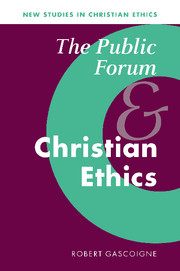Book contents
- Frontmatter
- Contents
- General editor's preface
- Acknowledgements
- Introduction
- 1 Revelation and reason in liberal societies
- 2 Revelation and a contemporary public ethics
- 3 The theology of revelation and Christian identity
- 4 The communication of Christian ethics in the public forum
- 5 Reconciling autonomy and community
- Select bibliography
- Index
General editor's preface
Published online by Cambridge University Press: 22 August 2009
- Frontmatter
- Contents
- General editor's preface
- Acknowledgements
- Introduction
- 1 Revelation and reason in liberal societies
- 2 Revelation and a contemporary public ethics
- 3 The theology of revelation and Christian identity
- 4 The communication of Christian ethics in the public forum
- 5 Reconciling autonomy and community
- Select bibliography
- Index
Summary
This book is the nineteenth in the series New Studies in Christian Ethics. It complements David Fergusson's well received Community, Liberalism and Christian Ethics, which appeared earlier in the series. If the latter is written from a Reformed Christian perspective, indebted to Karl Barth, Robert Gascoigne's The Public Forum and Christian Ethics is written from an explicitly Catholic perspective, indebted to Karl Rahner. It is a sign of theological ecumenism that their differing theological perspectives complement each other so well. Both also admirably enshrine the two aims of the series, namely to promote monographs in Christian ethics which engage centrally with the present secular moral debate at the highest possible intellectual level and, secondly, to encourage contributors to demonstrate that Christian ethics can make a distinctive contribution to this debate.
In this new monograph Robert Gascoigne makes an impressive argument for the public role of Christian ethics, even in a context of modern, pluralistic societies. Furthermore, he does this using a wide range of philosophical, theological and sociological writers. In the process he offers an extended critique of the influential ‘ecclesial ethicists’, such as Stanley Hauerwas and John Milbank, who argue that it is paramount to challenge secular society with Christian faith and with the values they believe derive directly from this faith. For them, conversion always takes priority over inclusion.
- Type
- Chapter
- Information
- The Public Forum and Christian Ethics , pp. xi - xiiPublisher: Cambridge University PressPrint publication year: 2000



